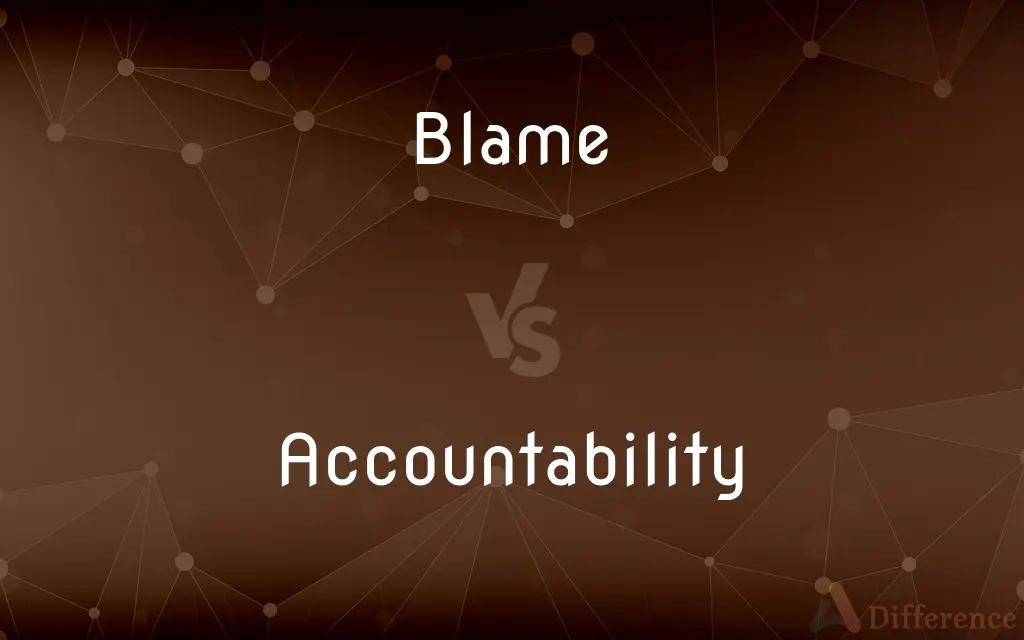Blame vs. Accountability — What's the Difference?
By Tayyaba Rehman — Published on October 21, 2023
Blame assigns fault for a wrong or mistake; Accountability takes responsibility for actions and their outcomes, whether good or bad.

Difference Between Blame and Accountability
Table of Contents
ADVERTISEMENT
Key Differences
Blame typically carries a negative connotation, implying a pointed finger at someone for a misdeed or error. It often serves to deflect responsibility from oneself. Accountability, on the other hand, is a broader term encompassing ownership of actions and their consequences, irrespective of their nature.
While Blame tends to be reactive and sometimes emotional, focusing on identifying who caused the problem, Accountability is proactive, focusing on understanding why a problem occurred and how to prevent it in the future. It promotes growth and learning.
In many instances, Blame can hinder progress and damage relationships, as it fosters an environment of fear and defensiveness. Accountability, in contrast, can foster trust and collaboration, as it encourages individuals to step up, acknowledge mistakes, and work towards solutions.
Blame can be seen as a means of protecting oneself by making others the scapegoat. This often halts the process of introspection and self-improvement. Accountability, however, drives personal and organizational growth, as it necessitates a deeper understanding of actions, their ramifications, and how to rectify or improve upon them.
Comparison Chart
Connotation
Negative
Neutral to Positive
ADVERTISEMENT
Focus
On who caused the problem
On understanding and rectifying the problem
Impact on Relationships
Can damage trust and collaboration
Fosters trust and collaboration
Role in Personal Growth
Hinders by deflecting responsibility
Promotes by encouraging ownership of actions
Emotional Undertone
Reactive and defensive
Proactive and constructive
Compare with Definitions
Blame
Blame implies criticism for wrongdoing or failure.
Parents often Blame video games for children's lack of focus.
Accountability
Accountability involves owning the consequences, good or bad.
With great power comes great Accountability.
Blame
Blame often carries an accusatory tone.
The manager was quick to Blame the intern for the oversight.
Accountability
Accountability promotes understanding and improvement.
Through Accountability, the team analyzed their mistakes and improved.
Blame
Blame is assigning fault to someone for a mistake.
She placed the Blame on her teammate for the project's failure.
Accountability
Accountability means taking responsibility for one's actions.
The CEO showed Accountability by addressing the company's shortcomings.
Blame
Blame can be a way of avoiding personal responsibility.
Instead of accepting his errors, he shifted the Blame to circumstances.
Accountability
Accountability goes beyond Blame, seeking solutions.
Instead of playing the Blame game, they emphasized Accountability and rectified the issue.
Blame
Blame identifies who is at fault.
The committee placed the Blame on the contractor for the delays.
Accountability
Expected or required to account for one's actions; answerable.
Blame
To consider responsible for a misdeed, failure, or undesirable outcome
Blamed the coach for the loss.
Blamed alcohol for his bad behavior.
Accountability
Capable of being explained
An accountable phenomenon.
Blame
To find fault with; criticize
I can't blame you for wanting your fair share.
Accountability
The state of being accountable; liability to be called on to render an account or give an explanation; liability to be held responsible or answerable for something.
Blame
To place responsibility for (something)
Blamed the crisis on poor planning.
Accountability
An open determination of one's responsibility for something and imposition of consequences.
Blame
The state of being responsible for a fault or error; culpability.
Accountability
Good-faith acceptance of one's responsibility for something and of its consequences.
Blame
Censure; condemnation
"Hoover hazarded more in the way of federal response to economic crisis than any president before him, but his efforts were not enough to divert the blame and wrath of the American people" (Michael B. Stoff).
Accountability
(military) The obligation imposed by law or regulation on an officer or other person for keeping accurate record of property, documents, or funds. The person having this obligation may or may not have actual possession of the property, documents, or funds. Accountability is concerned primarily with records, while responsibility is concerned primarily with custody, care, and safekeeping.
Blame
Censure.
Blame came from all directions.
Accountability
The state of being accountable; liability to be called on to render an account; the obligation to bear the consequences for failure to perform as expected; accountableness.
Blame
Culpability for something negative or undesirable.
The blame for starting the fire lies with the arsonist.
Accountability
Responsibility to someone or for some activity
Blame
Responsibility for something meriting censure.
They accepted the blame, but it was an accident.
Accountability
Accountability fosters trust and transparency.
Her Accountability in admitting her mistake earned her colleagues' respect.
Blame
(computing) A source control feature that can show which user was responsible for a particular portion of the source code.
Blame
To censure (someone or something); to criticize.
Blame
(obsolete) To bring into disrepute.
Blame
To assert or consider that someone is the cause of something negative; to place blame, to attribute responsibility (for something negative or for doing something negative).
The student driver was blamed for the accident.
Blame
To assert the cause of some bad event.
We blamed the accident on the student driver.
Blame
To censure; to express disapprobation of; to find fault with; to reproach.
We have none to blame but ourselves.
Blame
To bring reproach upon; to blemish.
She . . . blamed her noble blood.
You were to blame, I must be plain with you.
Blame
An expression of disapprobation fir something deemed to be wrong; imputation of fault; censure.
Let me bear the blame forever.
Blame
That which is deserving of censure or disapprobation; culpability; fault; crime; sin.
Holy and without blame before him in love.
Blame
Hurt; injury.
Blame
An accusation that you are responsible for some lapse or misdeed;
His incrimination was based on my testimony
The police laid the blame on on the driver
Blame
A reproach for some lapse or misdeed;
He took the blame for it
It was a bum rap
Blame
Put or pin the blame on
Blame
Harass with constant criticism;
Don't always pick on your little brother
Blame
Attribute responsibility to;
We blamed the accident on her
The tragedy was charged to her inexperience
Blame
Expletives used informally as intensifiers;
He's a blasted idiot
It's a blamed shame
A blame cold winter
Not a blessed dime
I'll be damned (or blessed or darned or goddamned) if I'll do any such thing
He's a damn (or goddam or goddamned) fool
A deuced idiot
Tired or his everlasting whimpering
An infernal nuisance
Common Curiosities
Is Accountability only about accepting mistakes?
No, Accountability is about taking responsibility for all actions and their outcomes, whether positive or negative.
Does Blame always indicate truth?
Not necessarily. Sometimes, Blame can be misdirected or based on incomplete information.
Does Blame always imply negativity?
Yes, Blame typically carries a negative connotation, assigning fault for a wrong or mistake.
Can one be accountable without placing Blame?
Yes, one can take Accountability for actions and seek solutions without pointing fingers.
Why is Blame often discouraged in professional settings?
Blame can hinder progress, damage relationships, and create a defensive environment.
Can Blame ever be constructive?
While Blame typically carries negative undertones, recognizing responsibility can lead to Accountability and constructive change.
Can a person be held accountable without being blamed?
Yes, Accountability focuses on responsibility and understanding, not necessarily on assigning fault.
How can one shift from a Blame mindset to an Accountability mindset?
Focusing on understanding, learning, and rectifying issues rather than just finding fault can foster Accountability over Blame.
What is the role of Accountability in leadership?
Accountability in leadership fosters trust, encourages responsibility, and drives growth and improvement.
How does Accountability relate to transparency?
Accountability often involves being transparent about actions, decisions, and their outcomes, fostering trust.
Does Accountability imply control over an outcome?
Not always. One can be accountable for their actions but not always for external factors influencing outcomes.
How can organizations promote a culture of Accountability?
By encouraging open communication, learning from mistakes, and valuing responsibility over fault-finding.
Why might someone avoid Blame?
Avoiding Blame can be a defense mechanism to protect oneself from criticism or repercussions.
Is Blame always external?
No, individuals can also self-blame, internalizing fault for outcomes.
How do Blame and Accountability differ in conflict resolution?
While Blame might perpetuate conflicts by focusing on fault, Accountability seeks understanding and solutions, promoting resolution.
Share Your Discovery

Previous Comparison
Mercalli Scale vs. Richter Scale
Next Comparison
Cost of Living vs. Standard of LivingAuthor Spotlight
Written by
Tayyaba RehmanTayyaba Rehman is a distinguished writer, currently serving as a primary contributor to askdifference.com. As a researcher in semantics and etymology, Tayyaba's passion for the complexity of languages and their distinctions has found a perfect home on the platform. Tayyaba delves into the intricacies of language, distinguishing between commonly confused words and phrases, thereby providing clarity for readers worldwide.














































